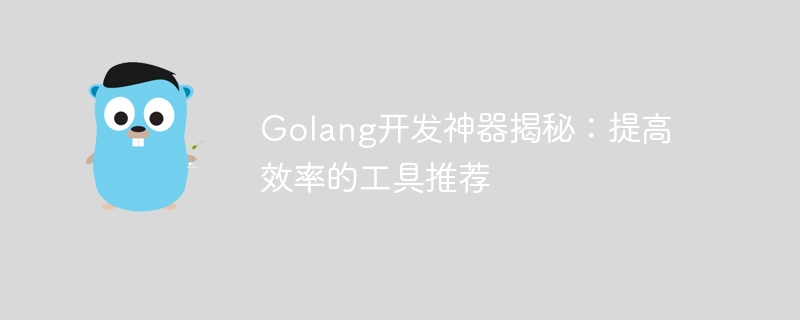
In today's fast-paced software development field, improving work efficiency is the goal of every developer. As an efficient, reliable, and concise programming language, Golang has always been favored by developers. In order to make better use of Golang development, developers actively explore and use various tools to improve development efficiency. This article will reveal some Golang development artifacts to help developers develop more efficiently.
- GoLand
GoLand is a powerful Golang integrated development environment (IDE) developed by JetBrains. Compared with other text editors, GoLand provides a wealth of functions and plug-ins, which can greatly improve development efficiency. It has functions such as intelligent code completion, code navigation, error repair, and refactoring. It also supports debugging and performance analysis functions, allowing developers to write and debug code more conveniently.
- Delve
Delve is a debugger for the Go language, which can help developers quickly locate errors and problems in the code. Delve provides a series of powerful debugging functions, such as breakpoint setting, variable viewing, stack tracing, etc., which can help developers better understand the execution process of the program. Using Delve, developers can quickly locate and fix problems and improve debugging efficiency.
- Dep
Dep is a dependency management tool for the Go language, which can help developers manage dependencies in projects. In the development of Go language projects, it is often necessary to introduce many third-party libraries to provide functional support. Dep can help developers automatically download and manage project dependencies, avoiding the cumbersome process of manual dependency management. Developers only need to define dependencies in the project and use Dep to install and update.
- Gin
Gin is a lightweight web framework for rapid development of Go language web applications. Gin provides a series of simple and flexible APIs that can help developers quickly build high-performance web applications. Gin not only has common functions such as routing processing, middleware, and static file services, but also supports advanced functions such as parameter binding, form validation, and request filtering, which can help developers better organize and manage web applications.
- Cobra
Cobra is a command line application framework for the Go language, which can help developers quickly build powerful command line tools. Cobra provides functions such as command and subcommand definition, parameter parsing, and help document generation, allowing developers to easily build complex and easy-to-use command line applications. Using Cobra, developers can better organize and manage command line tools and provide users with a better interactive experience.
- Wire
Wire is a lightweight dependency injection framework that can help developers manage and resolve dependencies in Go language projects. In large projects, dependencies tend to be complex and difficult to maintain. Wire can help developers use dependency injection to decouple and manage dependencies in projects, improving the readability and maintainability of code.
The above are some commonly used tool recommendations in Golang development, which can help developers improve work efficiency and code quality. Of course, each developer's needs and preferences may be different, and you can choose the appropriate tools and frameworks based on your own circumstances. In short, using these tools can enable us to get twice the result with half the effort in Golang development and experience a better development experience and efficiency.
The above is the detailed content of Revealing the efficiency improvement tools developed by Golang: magical recommendations. For more information, please follow other related articles on the PHP Chinese website!


 How to define variables in golang
How to define variables in golang
 What are the data conversion methods in golang?
What are the data conversion methods in golang?
 What are the commonly used libraries in golang?
What are the commonly used libraries in golang?
 What is the difference between golang and python
What is the difference between golang and python
 css3transition
css3transition
 How to use plot function in Python
How to use plot function in Python
 How to recover browser history on computer
How to recover browser history on computer
 What is the inscription in the blockchain?
What is the inscription in the blockchain?